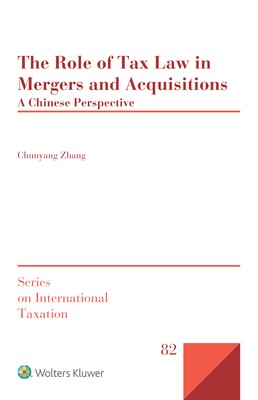
- Išsiųsime per 10–14 d.d.
- Autorius: Chunyang Zhang
- Leidėjas: Kluwer Law International
- ISBN-10: 9403537418
- ISBN-13: 9789403537412
- Formatas: 15.6 x 23.4 x 1.6 cm, kieti viršeliai
- Kalba: Anglų
- Extra -15 % nuolaida šiai knygai su kodu: ENG15
Atsiliepimai
Aprašymas
Series on International Taxation, Volume 82
The economic value of China's mergers and acquisitions (M&A) market is exceeded only by that of the United States. However, China's rapid and somewhat chaotic economic transformation has made the task of taxing M&A transactions in a consistent and prudent manner difficult, leading to a patchwork of fragmented rules that are hard to grasp not only for taxpayers but even for tax professionals and tax officials. Responding to this complex situation, this groundbreaking book explores in detail how income derived from M&A transactions is taxed in China. Using empirical studies in order to provide a first-hand understanding of the context in which the tax law operates, the book critically examines China's income tax regime for M&A and, based upon this examination, sets out reform proposals.
In six informative chapters of great practical relevance, the author thoroughly describes and explains the intersection of such aspects as the following:
M&A transactions in the eyes of tax law;
disparities between ordinary and special tax treatment;
eligibility for special tax treatment;
applying taxation principles such as neutrality and equity;
continuity of interest doctrine;
stock acquisition versus asset acquisition; and
adjustment to tax basis.
In addition to its empirical research, the analysis makes use of an examination of the rules and theories on taxing M&A in other jurisdictions such as Australia and the United States as part of its proposed blueprint for improving China's M&A taxation.
Drawing on commonly recognized taxation principles, this book definitively sets up the normative criteria for evaluating the income taxation of M&A and reveals the fundamental problems encountered by China's current regime. Its comprehensive analysis of the Chinese income tax rules for M&A and detailed disclosure of how they are both divergent from and convergent with that of some other major economies will prove of immeasurable value to in-house counsel for multinational corporations, business enterprises with interests in China, taxation consultants, taxation academics, and taxation authorities worldwide.
EXTRA 15 % nuolaida su kodu: ENG15
Akcija baigiasi už 5d.01:05:53
Nuolaidos kodas galioja perkant nuo 10 €. Nuolaidos nesumuojamos.

- Autorius: Chunyang Zhang
- Leidėjas: Kluwer Law International
- ISBN-10: 9403537418
- ISBN-13: 9789403537412
- Formatas: 15.6 x 23.4 x 1.6 cm, kieti viršeliai
- Kalba: Anglų
Series on International Taxation, Volume 82
The economic value of China's mergers and acquisitions (M&A) market is exceeded only by that of the United States. However, China's rapid and somewhat chaotic economic transformation has made the task of taxing M&A transactions in a consistent and prudent manner difficult, leading to a patchwork of fragmented rules that are hard to grasp not only for taxpayers but even for tax professionals and tax officials. Responding to this complex situation, this groundbreaking book explores in detail how income derived from M&A transactions is taxed in China. Using empirical studies in order to provide a first-hand understanding of the context in which the tax law operates, the book critically examines China's income tax regime for M&A and, based upon this examination, sets out reform proposals.
In six informative chapters of great practical relevance, the author thoroughly describes and explains the intersection of such aspects as the following:
M&A transactions in the eyes of tax law;
disparities between ordinary and special tax treatment;
eligibility for special tax treatment;
applying taxation principles such as neutrality and equity;
continuity of interest doctrine;
stock acquisition versus asset acquisition; and
adjustment to tax basis.
In addition to its empirical research, the analysis makes use of an examination of the rules and theories on taxing M&A in other jurisdictions such as Australia and the United States as part of its proposed blueprint for improving China's M&A taxation.
Drawing on commonly recognized taxation principles, this book definitively sets up the normative criteria for evaluating the income taxation of M&A and reveals the fundamental problems encountered by China's current regime. Its comprehensive analysis of the Chinese income tax rules for M&A and detailed disclosure of how they are both divergent from and convergent with that of some other major economies will prove of immeasurable value to in-house counsel for multinational corporations, business enterprises with interests in China, taxation consultants, taxation academics, and taxation authorities worldwide.




Atsiliepimai